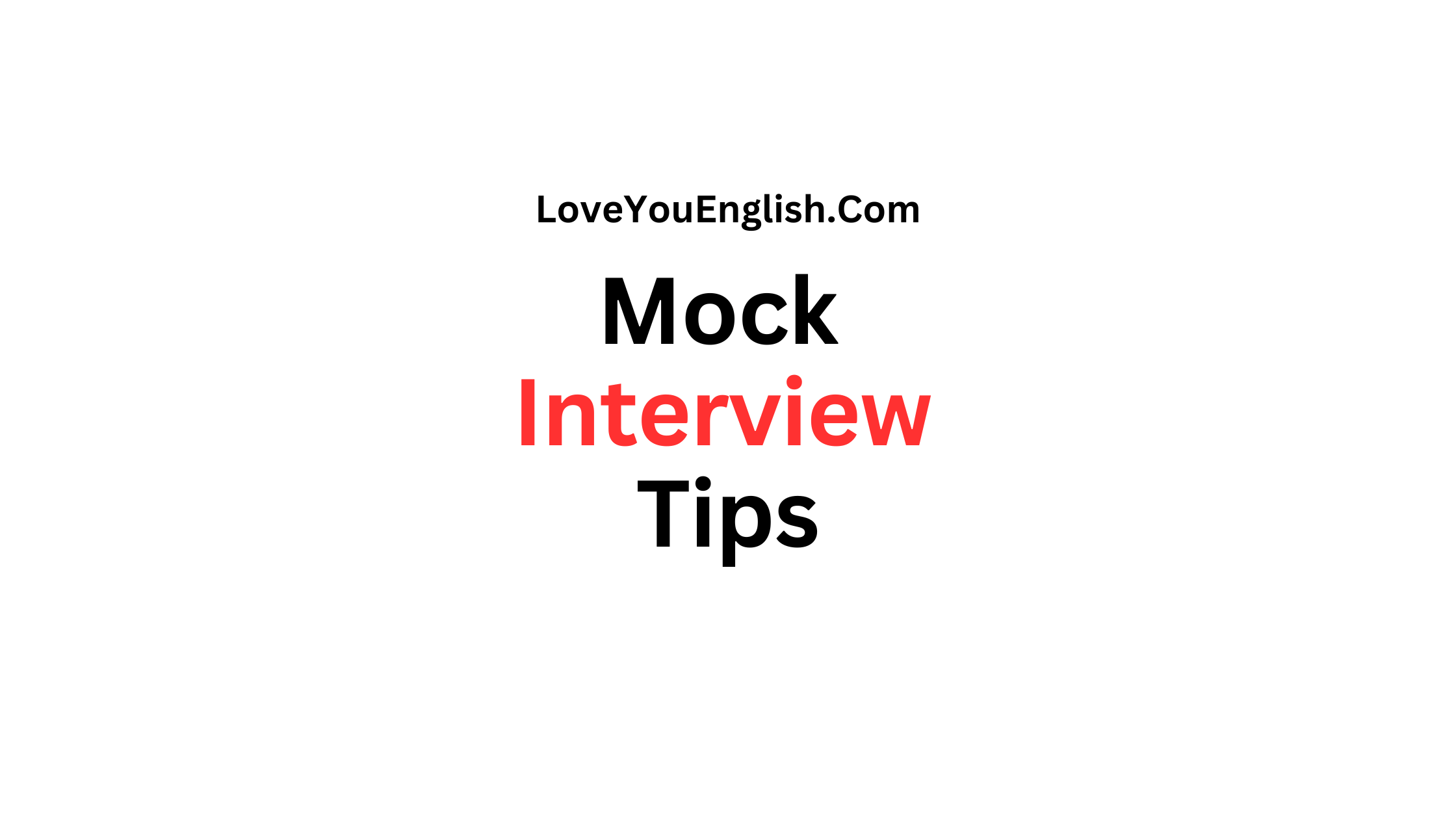Mock Interview Tips: How to Organize One & Why It Matters
Mock Interview Tips: How to Organize One & Why It Matters
In today’s tough job market, doing well in an interview can really change your chances of getting your dream job or missing out on a great chance.
While nothing beats real experience, practicing with mock interviews is a great way to prepare, gain confidence, and improve your interview skills.
This post will look at why mock interviews are important, how to set them up, and give you tips to make the most of this practice.
Understanding Mock Interviews
A mock interview is like a practice run for a real job interview.
It copies the format, style, and common questions you might face, letting you practice your answers, body language, and overall presentation in a safe setting.
The Importance of Mock Interviews
Boost Confidence:
One of the best things about mock interviews is that they help you feel more confident.
By practicing the interview experience, you can get used to the process, which can help lower your anxiety and nervousness when it’s time for the real interview.
Identify Weaknesses:
Mock interviews also help you find out what you need to work on.
Whether it’s having trouble with certain questions, keeping eye contact, or managing your time well, these practice sessions show you where you can improve.
Improve Your Answers:
By practicing and getting feedback, you can sharpen your answers to common interview questions.
This helps you express your ideas more clearly and briefly, making sure you show yourself in the best way possible.
Learn About Different Interview Types:
Companies and industries might have different ways of interviewing, like behavioral, technical, or case interviews.
Doing mock interviews lets you try out these different formats and get ready for them.
Lower Your Anxiety:
Knowing what to expect during the interview process can really help you feel less stressed about job interviews.
This can lead to doing better and having a more enjoyable experience overall.
How to Set Up a Mock Interview
Pick Your Interviewer:
Choose someone who can give you honest and helpful feedback.
This could be a friend, family member, mentor, or career advisor.
It’s best to pick someone who knows about hiring or your field.
Create the Right Atmosphere:
Make a space that feels like a real interview.
This could include:
- Wearing professional clothes
- Finding a quiet place without distractions
- Setting up a table or desk for the interview
- Using video call tools if you’re practicing for online interviews
Get Your Materials Ready:
Collect everything you would take to a real interview, such as:
- Several copies of your resume
- A portfolio of your work (if you have one)
- A notepad and pen
- Any other important documents.
Figure Out the Interview Style:
Choose what kind of interview you want to practice.
It could be a general interview, a behavioral one, or a technical interview that relates to your specific job area.
Make a List of Questions:
Gather a list of typical interview questions along with some that are specific to your industry.
Share this list with your practice interviewer ahead of time.
Set a Time Limit:
Interviews usually last from 30 minutes to an hour.
Decide on a reasonable time limit for your practice interview so you can work on managing your time well.
After the mock interview, have a session to talk about how it went and what you can improve on.
More related topics:
- 25 Essential Résumé Writing Tips
- Interview Tips: How to Get the Job
- The Dos and Don’ts of Remote Work Etiquette
- STAR Interview Questions and Answers
- The Dos and Don’ts of Working in Public
Conducting the Mock Interview
Start with Casual Conversation:
Kick off the mock interview with some easy-going chat, just like in real interviews.
This helps you get comfortable and connect with the interviewer.
Keep It Professional:
Treat the mock interview seriously, just like a real one.
This means:
- Sitting up straight and making eye contact
- Speaking clearly and with confidence
- Steering clear of filler words like “um” and “uh”
- Showing that you’re listening actively.
Make sure to give full answers to the questions and try to include specific examples when you can.
For behavioral questions, use the STAR method, which stands for Situation, Task, Action, and Result.
Prepare Questions:
Think of some smart questions to ask about the company and the job, just like you would in a real interview.
End the Interview Well:
Practice how to wrap up the interview in a professional way.
Thank the interviewer for their time and show that you are still interested in the job.
Post-Interview Reflection and Review
Quick Self-Reflection:
Right after the mock interview, take a few minutes to write down your thoughts.
What did you do well?
What was challenging?
Were there any questions that surprised you?
Feedback from the Interviewer:
Ask the person who did the mock interview to give you detailed feedback.
This should include:
- How you presented yourself and your attitude
- How strong and relevant your answers were
- Your body language and how you communicated without words
- What you did well and what you could improve on.
Review Your Recorded Sessions:
If you can, record your practice interview.
Video is best, but audio works too.
Watch the recording to see how you did from an outside perspective.
Make an Improvement Plan:
After getting feedback and thinking about your performance, create a plan to work on any weaknesses or things you want to get better at.
Tips for Great Mock Interviews
Practice Often:
Don’t just do one mock interview.
The more you practice, the more comfortable and skilled you’ll become.
Change Up Your Interviewers:
Try to have mock interviews with different people to get a variety of opinions and styles.
Research the Company and Position:
Treat each mock interview like it’s for a real job.
Look into the company, the industry, and the job description to customize your answers.
Work on sharing your experiences and skills through interesting stories.
This makes your answers more engaging and easier to remember.
Focus on Your Weaknesses:
Use mock interviews to practice the areas where you find it hard.
If technical questions are tough for you, make sure to practice those.
Try Different Interview Formats:
Practice with different types of interviews, like phone, video, and panel interviews.
Time Your Answers:
Keep an eye on how long your responses are.
Aim for answers that are detailed but also brief, usually around 1-2 minutes.
Be Ready for Surprises:
Ask your mock interviewer to throw in some unexpected questions to help you practice thinking quickly.
Mistakes to Avoid in Mock Interviews
Not Taking It Seriously:
Always treat your mock interviews like they are the real deal.
The more effort you put into practicing, the more you’ll learn and improve.
Memorizing Scripted Answers:
It’s great to prepare but try not to memorize your answers exactly.
If you do, you might come off as stiff and not very natural.
Ignoring Non-Verbal Communication:
Remember to focus on your body language, facial expressions, and how you say things.
These non-verbal signals are really important in actual interviews.
Failing to Research:
Make sure you do your homework.
Knowing about the company and the job will help you give better and more relevant answers.
Always have some good questions ready for your interviewer.
This shows that you are interested and engaged in the conversation.
Overlooking the Importance of Small Talk:
Don’t forget that making a connection is important.
Practice having some light, professional conversation.
Not Following Up:
After your mock interview, practice writing a thank-you note or email, just like you would after a real interview.
Using Technology for Practice Interviews
Video Call Platforms:
Try using tools like Zoom, Skype, or Google Meet to get better at interviewing from home.
Interview Recording Software:
Take advantage of apps that let you record your answers and give you helpful feedback.
AI Mock Interview Tools:
Look into AI-based tools that let you practice interviews as much as you want and give you quick feedback.
Virtual Reality Interview Experiences:
With new tech, think about using VR for practice interviews to make it feel more real.
Special Considerations for Different Job Types
Tech Interviews:
If you’re aiming for a job in tech, engineering, or science, make sure to include technical questions and problem-solving tasks in your practice.
Creative Jobs:
For careers in design, writing, or other creative areas, practice showing your portfolio and talking about your creative ideas.
Sales and Customer Service Roles:
Use role-playing to practice dealing with tough customers or making sales.
Management Roles:
Include questions about how you lead, solve conflicts, and think strategically.
Understanding the Mindset for Interviews
Handling Nerves:
Use practice interviews to find ways to cope with anxiety, like deep breathing or positive thinking.
Building Toughness:
Get used to bouncing back from mistakes or awkward moments during practice to prepare for real interviews.
Embracing a Learning Attitude:
Treat mock interviews as chances to learn instead of tests.
Welcome feedback and view challenges as ways to grow.
Being Present:
Focus on being completely engaged during the interview.
Pay attention to the conversation instead of stressing about how you’re doing.
Conclusion:
Mock interviews are super helpful when you’re looking for a job.
They give you a chance to practice, improve your skills, and build your confidence before you go into real interviews.
By setting up and taking part in mock interviews often, you can spot areas where you need to improve, refine your answers, and show the best version of yourself to future employers.
Always remember that the secret to nailing an interview is to prepare well and practice.
Think of each mock interview as a chance to learn something new and get better.
With hard work and regular practice, you’ll become more confident, clear in your speech, and ready to handle even the toughest interview questions.
As you keep searching for a job, make sure to include mock interviews in your preparation routine.
The time and effort you put into these practice sessions will really help when you’re sitting in front of a real interviewer, ready to show off your skills and land your dream job.
Good luck and enjoy the interview process!






![How to Write an Interview Thank You Email [Tips + Examples]](https://loveyouenglish.com/wp-content/uploads/2024/12/Copy-of-page-6-768x432.png)